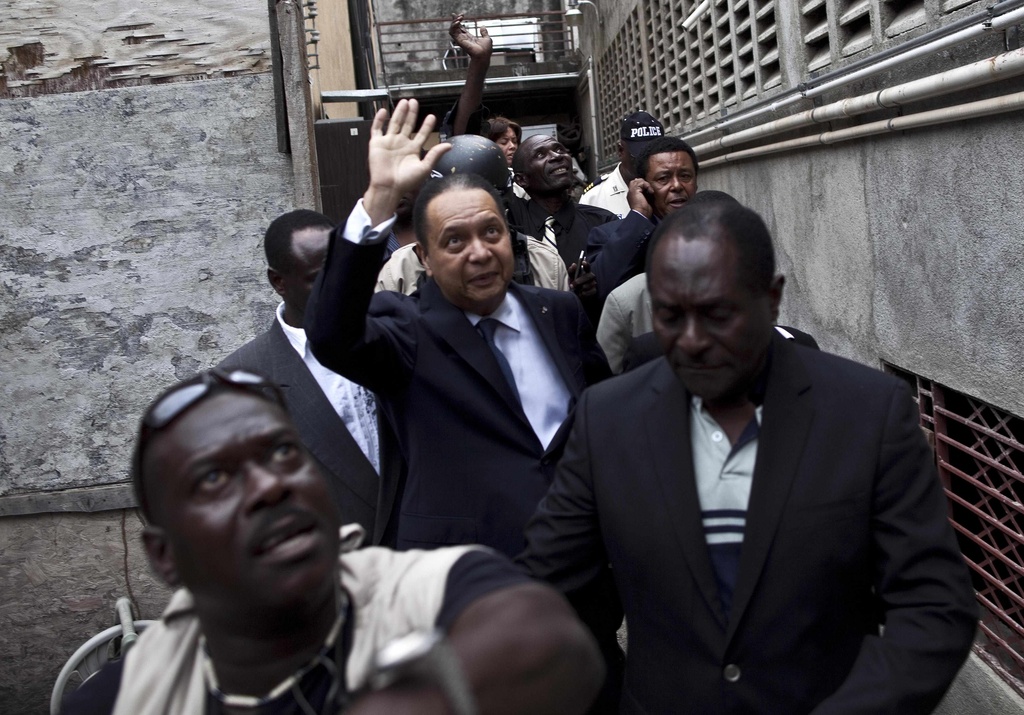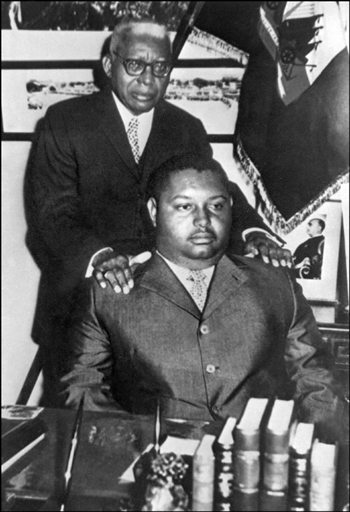Swiss hunter of embezzled funds comes clean

Geneva lawyer Enrico Monfrini talks to swissinfo.ch about the complex job of recovering dictators’ ill-gotten gains, made all the more tricky by fellow attorneys.
The 66-year-old has worked on a number of high-profile cases, including former Haitian leader Jean-Claude ‘Baby Doc’ Duvalier and Nigeria’s former leader General Sani Abacha.
According to the World Bank, some $20-$40 billion (SFr18.41–SFr36.82 billion) is siphoned off every year by corrupt leaders and governments and hidden in bank accounts around the world.
swissinfo.ch: When did you start hunting dictator funds?
Enrico Monfrini: When Olusegun Obasanjo became Nigerian president in 1999 he was determined to recover the funds embezzled by his predecessor Abacha, who had imprisoned him when he was in opposition. The police investigation uncovered traces of payments into Swiss accounts. That was when Obasanjo’s government looked for a lawyer in Switzerland to start work.
swissinfo.ch: Why were you chosen ?
E.M.: They were looking for someone they could trust. For 20 years I defended opponents of the Abacha regime who lived in Switzerland. One evening in September 1999 I was having dinner in a restaurant when I got a call from a Nigerian government official who asked to meet me immediately at his hotel. I went there and accepted the investigation; one week later I left for Nigeria with a colleague.
swissinfo.ch: What made you take on the job?
E.M.: I lived for many years in Africa as my father was an ambassador and I love this continent. Whether there or elsewhere, I cannot stand the profound injustices committed by corrupt leaders – despotic thieves who steal huge sums of money while the rest of the population lives in misery.
Recovering the money had a kind of symbolism. The SFr1.3 billion that I helped return to Nigeria was used to build hospitals and roads under World Bank supervision.
swissinfo.ch: How did you manage to recover the money?
E.M.: I went to Nigeria with a dozen pages of bank transfers that had been made to five Swiss accounts. But at the start of the investigation we discovered that these accounts had been closed. We didn’t know what to do, so I turned to Geneva’s state prosecutor Bernard Bertossa and filed criminal charges against members of the Abacha clan.
Bertossa had the power to set in motion a kind of “general alert” in all Swiss banks, forcing the institutions to block accounts belonging to the Abacha clan, in particular the dictator’s two sons. This is how $600 million appeared in one day. The accounts were opened under slightly modified names using false passports.
We were then able to obtain the necessary bank documents and that’s when the major part of the job started. We worked day and night interpreting the information and were able to reconstruct the flows of money. It was a real learning experience for my colleagues; I know the laws but not the practical aspects. Over the past 12 years we have turned into accountants.
It’s a difficult job especially because the people who help dictators hide money and who defend them are other lawyers.
swissinfo.ch: Were you scared of what might happen ? Did you receive any threats?
E.M.: No, I wasn’t afraid. Otherwise I couldn’t do this work. There were threats but veiled ones and not from Africans. They were from financial intermediaries in Switzerland, sometimes lawyers, who, feigning friendship, advised me to drop the whole business. They told me to be careful and suggested that I “not exaggerate” to avoid problems.
On some occasions I could have earned lots of money if I’d dropped certain things. But that’s not the way I think; unfortunately over the past few years no one has tries to corrupt me anymore because the rumour has spread (laughs).
swissinfo.ch: The Swiss government is often criticised over dictators’ funds that have ended up in Swiss bank accounts. What progress has it made in cleaning up its act?
E.M.: The new federal law on the restitution of assets of politically exposed persons obtained by unlawful means came into force on February 1, 2011. I helped put together this law, which is essential for resolving the case of assets belonging to the Haitian dictator Jean-Claude “Baby Doc” Duvalier.
It’s an important step. It regulates the measures for blocking and returning assets when an international request for judicial assistance cannot be concluded as a result of a collapse in the requesting state’s circumstances.
Some areas of criminal law, which no longer correspond with today’s criminal reality, will have to be adapted. After the developments of the past few years, Swiss banks generally no longer accept funds from people who are politically exposed or from their clans.
But dictators may continue trying to put their money in Swiss banks by using increasingly complex methods, such as accounts created on behalf of companies whose shareholders are based in the British Virgin Islands or in Panama.
swissinfo.ch: Would you be interested in helping return the assets belonging to former Tunisian President Zine el-Abidine Ben Ali?
E.M.: No, not with situation as it stands right now. In Tunisia there are still several members of the government linked to Ben Ali. I wouldn’t like to be the lawyer who has to find the funds, knowing that the person who gave me the job may have huge personal interests.
The need for a change in Swiss law became evident in connection with Swiss accounts held by the former president of Zaire, Mobutu Sese Seko, and the Duvalier family of Haiti.
The law, which came into force on February 1, allows the Federal Administrative Court to confiscate frozen assets that have been illicitly acquired if the home country fails to institute proceedings. These assets would then be used to finance programmes to benefit the population there.
Under the new law, the onus is on the depositor to prove the legal origin of the funds rather than on the plaintiff to prove the funds were stolen
Marcos, Philippines (1986 – 2003): $684 million returned to country
Abacha, Nigeria (1999-2005): $700 million returned to country
Montesinos, Peru (2002-2006): $92 million returned to country
Salinas, Mexico (1996-2008): $74 million returned to country
Mobutu, Congo (1997-2009): $6.7 million returned to Mobutu’s heirs.
Gbagbo, Ivory Coast: (2011-): n/a
Ben Ali, Tunisia (2011-) : tens of millions of dollars
Duvalier, Haiti (1986-2011): $5.7 million still frozen
(Translated by Simon Bradley)

In compliance with the JTI standards
More: SWI swissinfo.ch certified by the Journalism Trust Initiative












You can find an overview of ongoing debates with our journalists here . Please join us!
If you want to start a conversation about a topic raised in this article or want to report factual errors, email us at english@swissinfo.ch.